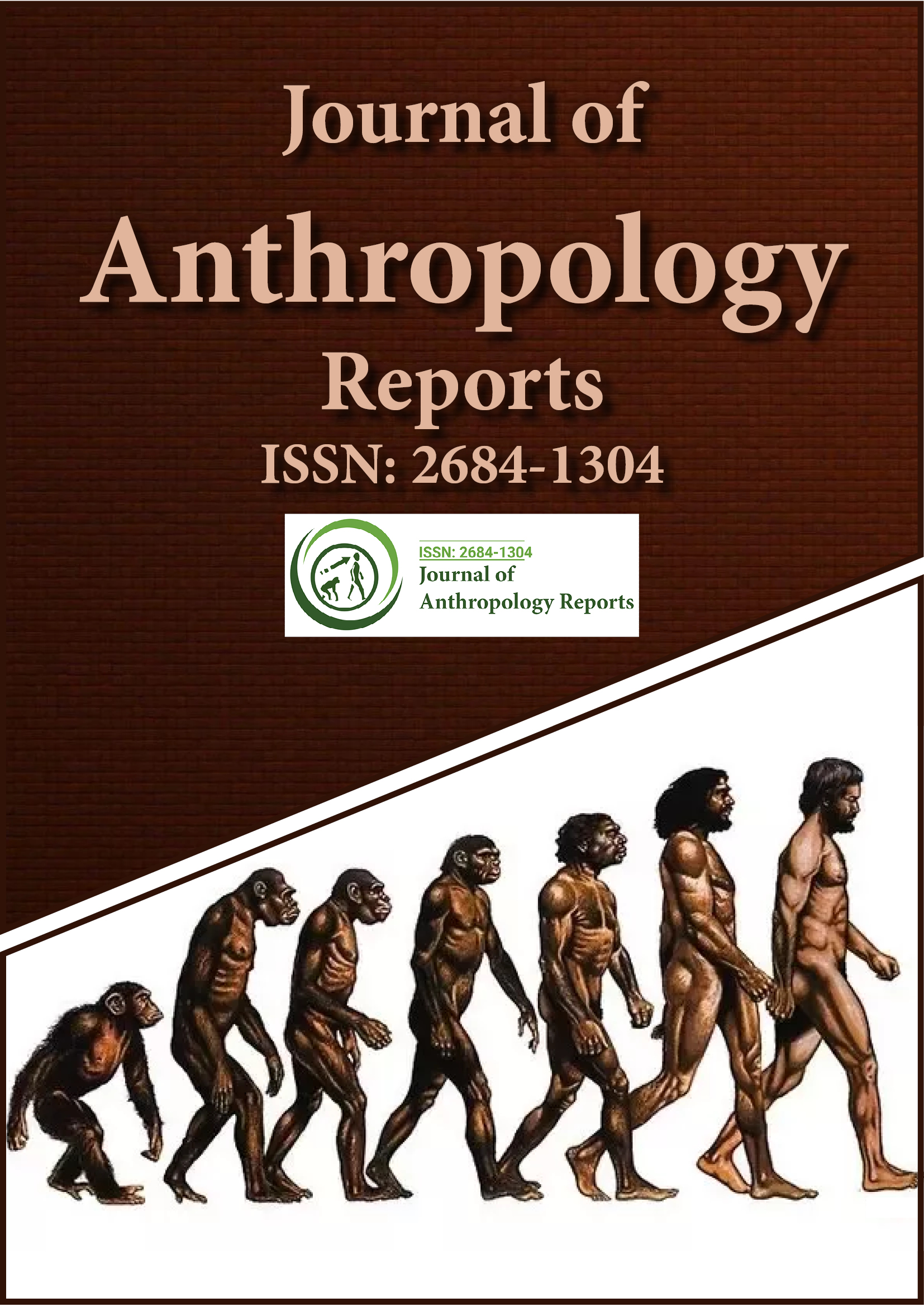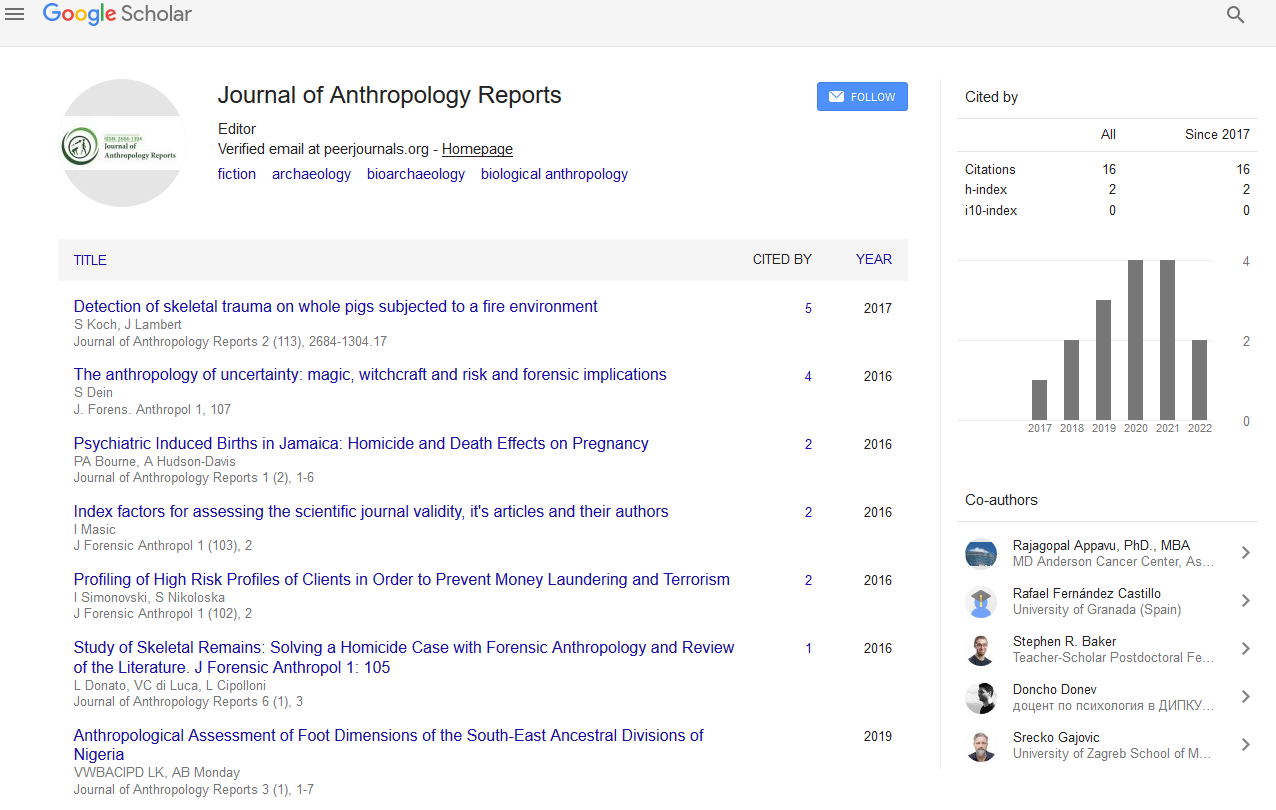Indexed In
- RefSeek
- Hamdard University
- EBSCO A-Z
Useful Links
Share This Page
Journal Flyer

Open Access Journals
- Agri and Aquaculture
- Biochemistry
- Bioinformatics & Systems Biology
- Business & Management
- Chemistry
- Clinical Sciences
- Engineering
- Food & Nutrition
- General Science
- Genetics & Molecular Biology
- Immunology & Microbiology
- Medical Sciences
- Neuroscience & Psychology
- Nursing & Health Care
- Pharmaceutical Sciences
Commentary - (2022) Volume 5, Issue 1
Bicultural Anthropology: Continuity and Change
Gerhard Weber*Received: 05-Jan-2022, Manuscript No. JFA-22-15493; Editor assigned: 07-Jan-2022, Pre QC No. JFA-22-15493; Reviewed: 09-Jan-2022, QC No. JFA-22-15493; Revised: 25-Jan-2022, Manuscript No. JFA-22-15493; Published: 31-Jan-2022, DOI: 10.35248/2684-1304.22.5.119
About the Study
Anthropology is the scientific study of humankind, dealing with mortal geste, mortal biology, culture, society, and linguistics, present and once, and early mortal species. Biological or physical anthropology studies the natural development of humans. Anthropologists take a broad approach to understanding different aspects of mortal experience. This is called holism they look through the history through archeology to see how groups of humans lived hundreds or thousands of times alone, and what was important to them. They take into account our body and genetics, as well as what constitutes our bones, nutrition and health.
Anthropologists also compare humans to other creatures substantially other primates similar as monkeys and chimpanzees to see what we partake with them and what makes us unique. Nearly all humans need the same effects, similar as food, water, and courting, to survive, but the ways people meet these requirements are veritably different. For illustration, everyone needs to eat, but people eat different foods and consume them in different ways. Thus, anthropologists explore how different groups of people get, prepare, and share food. World hunger isn’t a product issue, but a hedge to social distribution, and Amartya Sen was awarded the Nobel Prize for showing that this applies to all dearths of the 20th century. Anthropologists also try to understand how people interact in social connections for illustration, with family and musketeers.
They see different ways in which people dress and communicate in different societies. Anthropologists may use these comparisons to understand their society. Numerous anthropologists work in their societies dealing with economics, health, education, law, and politics to name a many. In trying to understand these complex issues, they take into account knowledge of biology, culture, modes of communication, and how people lived in the history. While anthropologists pay important attention to the similarities of mortal groups across time and space, they’re also studying how these groups differ. There are numerous ways to do anthropology, as different as humans physically acclimatize to the terrain, make and organize societies, and communicate.
A unique approach to anthropology has been developed in numerous countries around the world. For illustration, in some countries the four- field approach isn’t as important as in other countries. Anthropologists around the world are working together through transnational associations to more understand our lives as mortal beings. Mortal wisdom studies humans in numerous aspects, from the history of Homo sapiens biology and elaboration to the social and artistic characteristics that decisively distinguish humans from other beast species. Due to its diversity of content, ethnology has evolved into a collection of special disciplines, especially since themid-20th century. Biological anthropology is a field concentrated on mortal biology and elaboration. This is explained in detail in the composition on mortal elaboration.
The use of a biocultural framework can be seen as an application of a theoretical lens that integrates disease and reification. This kind of understanding requires a cultural perspective of the region, an understanding of illness and frailty, and regional practices of traditional or biomedical healing. “This integrated work requires strong method orientation and openness to a variety of often competing theoretical paradigms. Health and healing studies from a biological and cultural perspective focus on illness.
Put it in the context of how culture embodies the illness that it perceives as a result of the illness.
Therefore, the biocultural approach is as a feedback system through biological and cultural interactions. It can be understood. Biology enables certain behaviors, which affect biological properties. Through the understanding of both the biological and cultural implications of disease and embodiment, healing becomes a cultural product, something that makes sense within a particular cultural context. Biocultural research involves integrating how cultures approach health and healing based on gender, class, age, education, and their own traditional experience with illness and healing.
Citation: Weber G (2022) Bicultural Anthropology: Continuity and Change. J Anthropology Rep. 5:119.
Copyright: & copy; 2022 Weber G. This is an open access article distributed under the terms of the Creative Commons Attribution License, which permits unrestricted use, distribution, and reproduction in any medium, provided the original author and source are credited.

